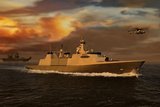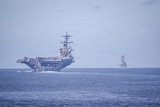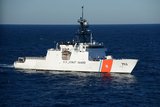Raytheon unveils details of its proposal for the US Navy/NATO ESSM Next Significant Variant
In an exclusive interview with Shephard, Raytheon’s VP of Shipboard Missiles disclosed what improvements the company plans to offer for the Sea Sparrow NSV.
Thyssenkrupp Marine Systems has finalised an agreement with the procurement authorities of Germany and Norway for the purchase of six Type 212 CD (Common Design) submarines, the company announced.
In a 24 March statement, the company said that “after challenging negotiations”, all parties agreed to the technical content and contractual terms shortly before midnight on 22 March.
The design of the Type 212A submarine, which is already in service with the German and Italian navies, will be further developed with the integration of advanced technologies to expand the U212 family in Europe.
Construction of the first submarine could begin in 2023 if the contract is signed in mid-2021. Delivery of the first submarine for the Norwegian Navy is expected from 2029, while the delivery of the two boats for the German Navy is scheduled for 2031 and 2034.
Thyssenkrupp said that it had already started investing some €250 million in 2019 for Thyssenkrupp Marine Systems at the Kiel location in preparation for the expected order.
The statement said that with the progress now achieved in the Norwegian-German U212CD strategic cooperation project, Thyssenkrupp Marine Systems would be able to consolidate its partnership with Kongsberg Defence & Aerospace (KDA), which has been in place since 2017.
‘This order represents the most important project for Thyssenkrupp Marine Systems for the next decade and will secure employment, not only in Kiel, for years to come,’ Rolf Wirtz, CEO of Thyssenkrupp Marine Systems, said.
‘The contract, which has yet to be signed, contains tough conditions for us. Nevertheless, for now we are happy to take this big step towards signing the contract and thank our customers for the trust they are placing in us.’
Eirik Lie, President Kongsberg Defence & Aerospace, said: ‘This is a new important milestone in the collaboration between the two nations with an industrial perspective. Together we will make next-generation world-class submarines and combat systems, and the agreement will lead to new innovations and value creation, not only for KDA but also for our subcontractors and other medium-sized Norwegian companies in the future.’
The statement said that the result of the negotiations still has to be considered in the coming weeks by the partners in Norway and Germany so that the parliamentary ratification procedure in Germany can be served on schedule.
As part of our promise to deliver comprehensive coverage to our Defence Insight and Premium News subscribers, our curated defence news content provides the latest industry updates, contract awards and programme milestones.

In an exclusive interview with Shephard, Raytheon’s VP of Shipboard Missiles disclosed what improvements the company plans to offer for the Sea Sparrow NSV.

Delays in the construction of the Polar Security Cutter – the future substitute for the Polar Star – are likely to prolong the ageing icebreaker’s service time even more, putting the USCG in a risky position.

The adaptable design of Babcock’s Arrowhead 140 frigate, already selected by the UK Royal Navy and Poland, has led to more orders from Indonesia while other countries continue to weigh it up.

The presence of the USS Abraham Lincoln Carrier Strike Group in the Persian Gulf means additional naval and aerial capabilities, which provides the US with multiple attacking options.

The US Navy’s acceleration of its laser weapon development initiatives reflects a decisive shift towards ultimately having a “laser on every ship” across tomorrow’s surface fleet.

The new frigate class’s focus on modularity, speed to build and enhanced armament align with the priorities of the US Navy’s Golden Fleet.